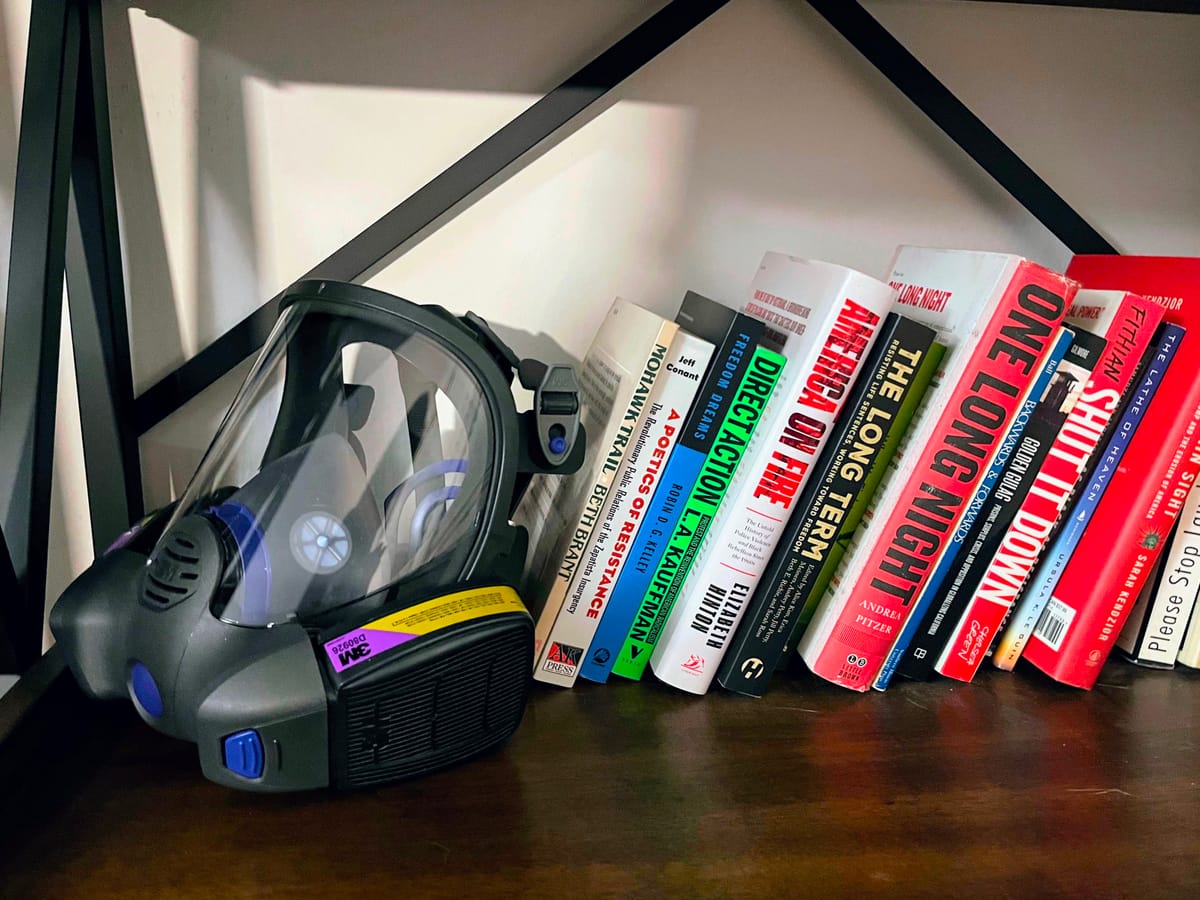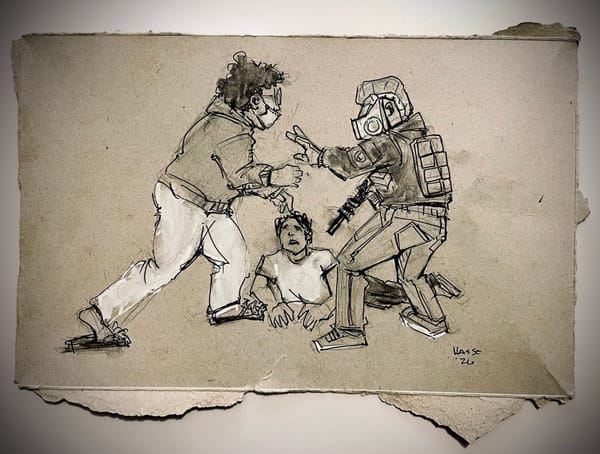The Emergency Is the Atmosphere
“It’s meant to exhaust us. It’s meant to destroy us."


My city is under siege. Troops are arriving in the suburbs. Federal agents are storming apartment buildings, pulling people out of cars and beds, shooting people in the street, robbing children of their parents, and we can barely track the damage, let alone get in the way. We're told not to get in the way. We're told to film them. Sometimes they arrest people for that too. We're told to write it all down, so that we can at least track what’s happened to people, give the lawyers and people’s families a chance to react, to try to intervene, to at least know. We want to do more, but decency has been criminalized, and the charges are often steep.
At the Broadview ICE facility, some of us were trying to physically get in the way, blocking cars with our bodies while federal agents fired pepper balls and tear gas canisters at us. Now, the state police have shut down that small window of intervention by walling protesters off in “first amendment zones,” arresting people with an expediency that renders our previous actions untenable. I believe Governor J.B. Pritzker thought that if he restored “order” outside Broadview, Trump would have no “excuse” to send in the National Guard. Trump—whose relationship with reality is contemptuous, at best—called our efforts to halt cars with our bodies, while being gassed and brutalized, “riots.” His agents attacked us, even when we were cooperative and contained, behind a wall of state troopers. While some fretted over the behavior of protesters, these men, who performed brutality for their own cameras, were always going to riot. They have waged violence and terror, making propaganda films of their own chaos, and insisted their monstrous Instagram reels are proof that Chicagoland is a war zone. They have battered and shot people, looted buildings, gassed neighborhoods, contaminating and violating everything they touch—and said, Look what they made us do. They’re out of control.
Fascists make their own excuses.
While there is a predictable progression to Trump declaring war and then making war, there is no discernable rhythm to trace or react to in this. The violence is an erratic pattern we inhabit—like someone smashing their hands across piano keys again and again until the noise becomes a score.
It’s meant to exhaust us. It’s meant to destroy us. But we keep moving.
I attend organizing meetings. I protest. I join ICE patrols. I coordinate, connect, console. I am always thinking—strategizing, dissecting, self-critiquing—at work, in the bathtub, late at night, and too early in the morning. Some of my ideas are good. Some are awful. Most won’t go anywhere. But I keep thinking, and I keep trying.
There’s a gas mask on a bookshelf in my living room. I keep telling myself to move it to the car, in case ICE drops a tear gas canister in the street again because someone heckled them or hit record. I want to be useful, and hold my ground, when others are hurt or being brave. So, I should remember to put the gas mask in the car.
I feel awful. And that feeling is the cost of caring, so I don’t want it to fully go away. But, sometimes, I want it to quiet down. And it doesn’t.
So, I watch Star Trek. I eat a decent meal. I talk to a friend. Sometimes I am even present. Often, I’m distracted. I might say something careless when someone needs to feel their worth recognized. I might fail to ask the most obvious question about how someone’s doing. Sometimes I'm not really there, because I’m rethinking logistics, or worrying about which text thread is making my phone vibrate—the phone that I’ve silenced so I can focus on the person in front of me, still vying for my attention with an unknown level of urgency that claws at me.
I forget what I meant to say. I forget what I owe to the person in front of me.
My friends are patient and forgiving. Most of them are struggling too. We are trying to hold our ground against an intractable enemy. We are trying to out-think brute force. We are moving in opposition to the greatest purveyor of violence in the world, without the infrastructure or resources that our efforts require. We are stretched. And there is no end in sight.
There was a time when I might have had about three drinks a night about this. But I’ve gotten older, and there are consequences for that kind of escapism that I can no longer afford. So I stay anxious—with an added level of worry about what all of this activation is doing to my body.
Because I know what this is. Acute stress is meant to help us escape danger. When those feelings never fade, the body becomes a conflict zone. Our blood pressure and blood sugar become dysregulated. Inflammation doesn't dissipate. Sleep fractures. Digestion falters. The amygdala, which governs fear, becomes more reactive, while the prefrontal cortex, which affords us judgment and long-term perspective, gets weaker. We become more sensitive to danger and less capable of coherently responding to it. And over time, the body forgets how to return to its baseline. Emergency becomes the atmosphere. We stew in our stress hormones. We run on them, and we grind ourselves into ruin.
So I try to create pockets of stillness, moments to inhale deeply, to uncouple myself from the thrashing, unnerving, chaotic score that never stops playing. Because I don't want to feel this way all the time, and I know I can't sustain it. But I'm afraid of what happens if I stop feeling too much. I don't want to become someone who moves and breathes like all of this is normal. I am afraid of what that would make me. I am afraid of what that tendency has already made me, in some ways, and what it has made the world.
When I was younger, I thought I was missing some basic psychological component—a psychic gasket that allowed other people to move through the world, seeing what I saw, without reacting. Unbothered. Uncurious. I thought that the absence of that missing part was eventually going to kill me.
Now, I understand the coping mechanisms and cognitive styles that allow people to tolerate consciousness—overwhelming to so many of us on an ordinary day—are actually killing them, en masse. I thought I was the hopelessly broken one. But I was a fire alarm among people who couldn't smell smoke.
I cannot make peace with the world such as it is, and so I cannot anesthetize myself into acceptance—and I am okay with that. Because the world needs walking, talking fire alarms. It needs people who are willing to drink the full poison of reality and make sense of it. It needs people who will invite others to be curious, as gently as necessary, until they can defy themselves enough to smell smoke, taste ash, and scream no.
And still, I have to find a way to live in this body, right now, when all my grounding routines are falling short. When nothing inside me ever seems to slow down.
Some of us are shaped by trauma in particular ways. We're good in a crisis. We become dependent on our stress hormones. I had come a long way in unlearning these patterns, and even felt like my work was almost good enough when my mind wasn't racing.
Now, I can feel my old wiring kicking in, like a redundant system.
So, I need to figure something out. Maybe I will visit a drop-in space. Maybe I will finally take up meditation. Maybe I will have one of those breakthrough conversations that reorient everything and leave you feeling like everything is possible again. Maybe I will disappear into the woods for a few days—when there's time.
There just isn’t enough time.
There’s only what we manage to make of it—what we build, what we protect, what we remember to carry to the car. The gas mask. The snacks. The question we forgot to ask. The name of the person taken.
I don’t want to get used to any of this. I don’t want to lose the part of myself that still startles, still aches, still sounds the alarm. But I also want to keep my body. I want to keep my mind. I want to keep my people. I want to make it through.
So I will find a way to keep burning without burning out. I will find moments to breathe, to soften, to hold what’s unbearable without letting it hollow me out. The goal is to feel without coming apart. And to keep going—until we don’t have to live like this anymore.
Organizing My Thoughts is a reader-supported newsletter. If you appreciate my work, please consider becoming a free or paid subscriber today. There are no paywalls for the essays, reports, interviews, and excerpts published here. However, I could not do this work without the support of readers like you, so if you are able to contribute financially, I would greatly appreciate your help.




